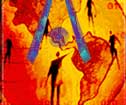 Thursday was the official kick-off of the Austin Game Conference, a trade show primarily directed at companies who produce Massively Multiplayer Online games, or MMOs. This morning, Jane McGonigal from 42 Entertainment gave a talk in which she outlined what ARGs are, how they are a type of MMO, and why they are so interesting.
Thursday was the official kick-off of the Austin Game Conference, a trade show primarily directed at companies who produce Massively Multiplayer Online games, or MMOs. This morning, Jane McGonigal from 42 Entertainment gave a talk in which she outlined what ARGs are, how they are a type of MMO, and why they are so interesting.
And the best part, other than the Massively Multiplayer Thumb Wrestling? The unofficial nickname for the talk: “Too Weird for GDC”.
Jane began the session with some explanations of what ARGs are. They are interactive narrative, or immersive drama. They are played out online and in the real world, taking place over several weeks or months. Tens, hundreds, sometimes tens of thousands of people play, forming collaborative social networks and working together to solve a mystery or problem which is impossible to solve alone. Platforms utilized include e-mail, websites, SMS, phone calls, radio, IRC, instant messages, newspapers, real world artifacts and events, and Elan’s dream: toasters that print messages on your bread. Since this is the second time in two days that a 42 staffer has mentioned toaster messages, extra vigilance is recommended when cooking your breakfast. Be prepared.
